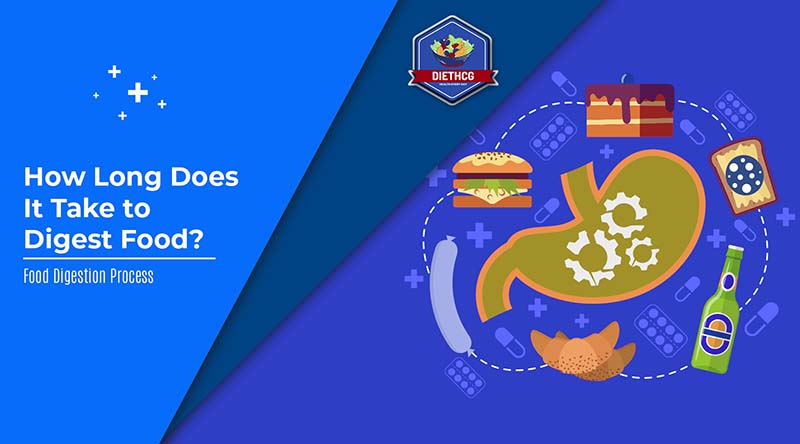The time required for food to travel through the digestive tract is not fixed; it significantly depends on the specific types and amounts of food ingested. This process is further complicated by several other factors, including an individual’s sex, their metabolic speed, and the presence of any digestive disorders, all of which can either accelerate or slow down the digestion process. Digestive efficiency varies from person to person, making the digestion duration highly individualistic and influenced by a complex interplay of biological and dietary factors. The article below will answer questions with the frequently asked question being “How long does it take to digest food?”

1. How Does the Process of Food Digestion Occur?
Digesting food is a complicated process with several important steps. These include eating, moving the food through the body, breaking it down physically and chemically, absorbing the nutrients, and finally, getting rid of waste.
When you eat, food goes into your mouth where it mixes with saliva. Saliva has enzymes that start breaking down the food’s carbohydrates and fats. Chewing helps break the food into smaller pieces, making it easier to swallow.
After you swallow, a process called peristalsis kicks in. This is where muscles in your digestive system contract and relax, moving the food along. It’s like a wave pushing food through a tunnel, mixing it with digestive juices as it goes.
Inside your stomach, the food gets churned and mixed with stomach acids, turning it into a mushy substance called chyme. In the small intestine, there’s more mixing and breaking down of food. This time, it’s happening on a smaller scale, helping to release nutrients.
Chemical digestion starts in your mouth and continues in your small intestine. Special juices break down complex food molecules into simpler ones that your body can use. These juices contain water, enzymes, acids, and salts that help with the breakdown.
Most of the nutrients your body needs are absorbed in the small intestine. They pass through the walls of the intestine into your bloodstream. Fats have a special route – they’re absorbed into special vessels called lacteals and then transported to the bloodstream through lymphatic vessels.
Finally, what’s left – the stuff your body can’t use – is pushed out as waste during defecation.
Understanding how your body digests food is important for keeping your digestion and overall health in good shape.

2. How Long Does It Take to Digest Food?
Typically, food takes anywhere from 24 to 72 hours to travel through your digestive system. However, this duration can vary depending on factors such as the quantity and types of foods consumed.
Various factors influence digestion speed, including gender, metabolism, and any underlying digestive conditions that may affect the process.
Initially, food moves relatively swiftly through your digestive tract. Within 6 to 8 hours, it traverses through your stomach, small intestine, and large intestine.
Once in the large intestine, the partially digested food can remain for over a day as it undergoes further breakdown.
The standard range for transit time includes gastric emptying (2 to 5 hours), small bowel transit (2 to 6 hours), colonic transit (10 to 59 hours), and whole gut transit (10 to 73 hours).
Digestion speed is also influenced by the composition of your meal. Foods rich in protein and fats, like meat and fish, can take up to 2 days to fully digest due to their complex molecular structure.
On the other hand, fruits and vegetables, high in fiber, can pass through your system in less than a day. These fiber-rich foods promote efficient digestion overall.
Processed, sugary junk foods, such as candy bars, are the quickest to digest, typically processed within a few hours, leading to a rapid return of hunger.

3. Some Issues That Can Affect the Digestion Process
Various factors can influence the digestion process, leading to variations in how long it takes for food to digest. These factors include:
- Body type: Different body types may digest food at different rates.
- Metabolism: Individuals with faster metabolisms may digest food more quickly.
- Medications: Certain medications can affect digestion speed.
- Types of food: The composition of the foods consumed can impact digestion time.
- Level of physical activity: Regular exercise and physical activity can influence digestion.
- Lifestyle: Living a sedentary lifestyle versus an active one can affect digestion.
- Past surgeries: Previous surgical procedures may alter digestion.
- Stress level: High stress levels can disrupt the digestive process.
- Genetics and age: Genetic factors and age can play a role in digestion speed. Metabolism tends to slow down with age.

Gastroenterologist Christine Lee, MD, emphasizes the role of genetics and age, noting that some individuals naturally have faster metabolisms, while aging can lead to a slowdown in metabolism and motility. Age-related conditions such as high blood pressure, diabetes, and atherosclerosis can also affect digestion, along with medications used to manage these conditions.
Medications and supplements that may impact digestion include those used to treat arthritis, depression, spasms, diabetes, Parkinson’s disease, and oral contraceptives. These medications can potentially alter digestion speed and efficiency.
4. Conclusion
In conclusion, understanding “How long does it takes to digest food” is crucial for maintaining a healthy gut and overall well-being. We’ve explored the various factors influencing digestion and offered valuable insights to help you make informed choices. We’d love to hear your experiences and feedback—share your stories with us! Don’t forget to check out more insightful blogs on digestive health from DietHCG. Keep nourishing your body and embracing a happier, healthier lifestyle.


